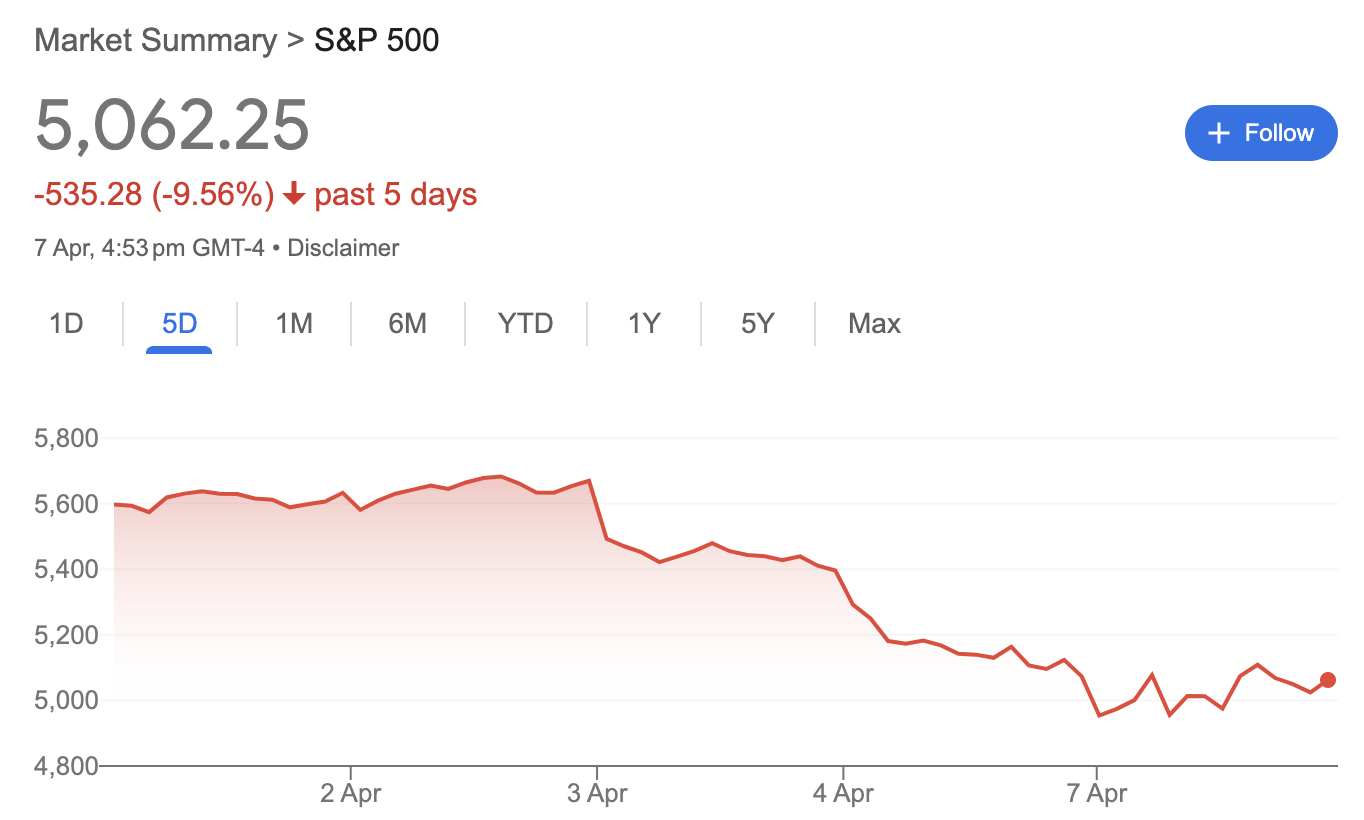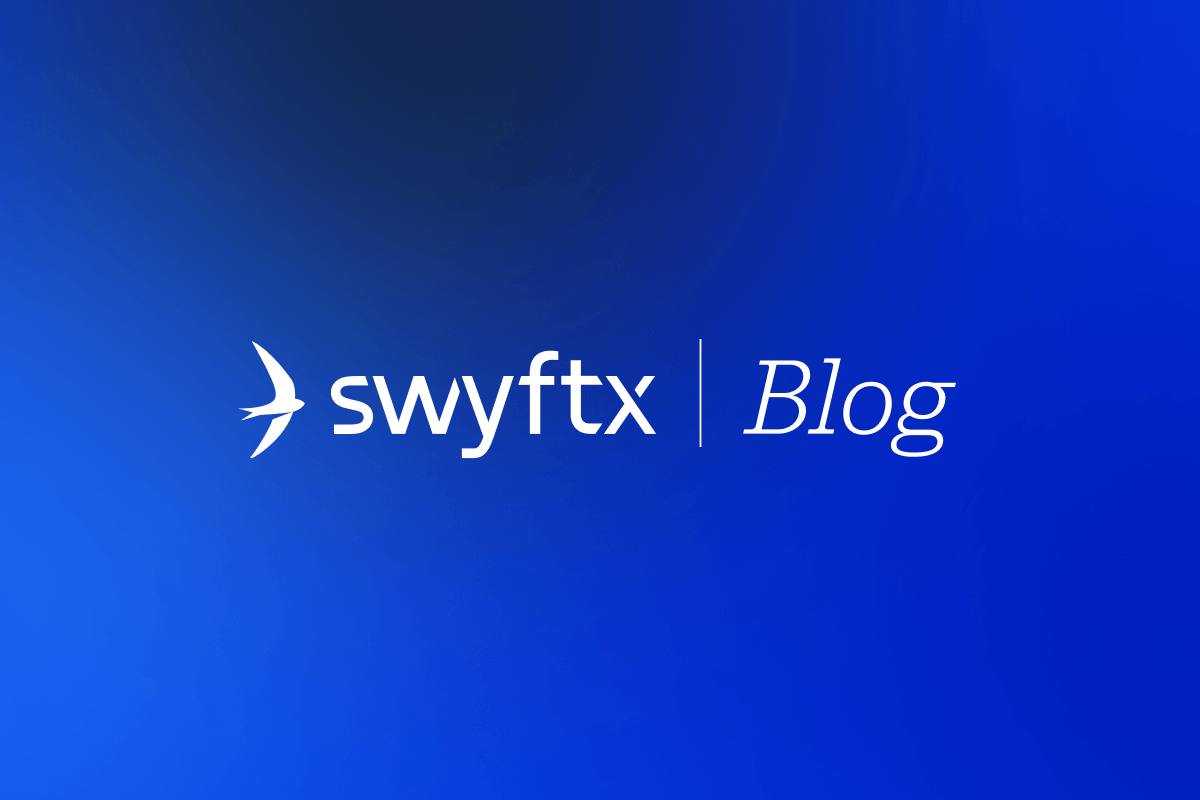- > Trump’s Trade War Shocks Markets as Investors Hit the Panic Button
- > SEC tackles regulatory easing, stablecoins as crypto bills hit Parliament
- > Mastercard marches further into crypto with ambitious plan to simplify payments
- > Former Binance CEO Changpeng Zhao named Pakistan’s crypto advisor
Trump’s Trade War Shocks Markets as Investors Hit the Panic Button
Another News on the Block, another fortnight of US President Donald Trump dominating global headlines.
The polarising political figure unveiled his latest round of reciprocal tariffs last week, on a day the White House dubbed ‘Liberation Day’.
The leading rationale from Trump was to match tariffs placed upon the US by other countries. With some in the market believing this may only manifest as a baseline 10% tax on US imports, the price of Bitcoin (and other cryptocurrencies) was buoyed in the lead-up to liberation day.

However, this optimism was short-lived when the full extent of the tariffs was unveiled.
It became clear that the tax figures selected by the White House weren’t purely reciprocal – rather, many are claiming they are targeting the US trade deficit.
This led to much higher than anticipated tariffs across the board, with the US Government going as far as imposing a 100%+ tax on Chinese imports.
Liberation Day itself didn’t send the crypto market into hysterics, with BTC holding strong at $82k USD in the days following.
However, once it became clear the tariffs weren’t going to be softened – at least in the short term – global equities went into SELL mode.
The markets opened on Monday to a sea of red, with leading indices across Tawain (-10%), Japan (-7%), Australia (-4%) and the United States’ NDQ (-6%) bleeding money.
The crypto market quickly followed suit, with BTC tumbling as low as $75k USD.
However, in the past few days Bitcoin has been a bastion of resilience, recovering to $80k USD and outperforming major indices like S&P 500 and the Nasdaq.

Now the question on everyone’s lips is: Where to from here?
Clearly, the market has priced in at least some of the impending economic turbulence that would arise from a potential trade war between China and the US.
Additionally, recession fears are growing in the States with some suggesting inflation is a possible byproduct of Trump’s tariffs.
Finally, global economic tensions could tighten depending on how governments respond to the White House’s Liberation Day. Reciprocal tariffs targeting…reciprocal tariffs could cause widespread instability that will likely sear volatility into both the crypto and equity markets.
It’s not all doom and gloom though. Bitcoin and the broader crypto market haven’t plunged into total meltdown despite the bleak economic outlook. And concessions forming between the US and other nations could push some positivity back into the markets.
In fact, on Thursday morning we saw Trump halt some of the tariffs rollout, which sent several cryptocurrencies soaring 10%+ in a matter of hours. So when there’s even a modicum of economic stability, bullishness in the crypto market can still rear its head.
But in the short term, investors may have to hold on for dear life while the dust ever-so-slowly settles.
SEC tackles regulatory easing, stablecoins as crypto bills hit Parliament
The US Securities and Exchange Commission (SEC) is continuing to shape up the regulatory landscape for the digital asset industry.
Last month saw the dismissal of several high-profile lawsuits targeting crypto exchanges and projects, reflecting a changing stance on digital currencies by US regulators.
Now, acting SEC Chair Mark Uyeda has ordered a series of reviews intended to amend past official statements toward the crypto industry.
These include a framework for ‘Investment Contracts’ that cautions digital currency projects about the risk of selling unregistered securities, a key issue in the SEC’s past enforcement-driven approach to crypto regulation.
Although these reviews will unlikely evolve into actual policy changes, they will help further clear the air for the digital asset industry.
Meanwhile, the US House Financial Services Committee passed the Stablecoin Transparency and Accountability for a Better Ledger Economy Act.
(Yes, that does shorten to the STABLE Act).
In essence, the STABLE Act intends to improve regulatory clarity for payment stablecoins in the United States, focusing on protecting consumers while fostering innovation.
Key to this will be classifying stablecoins as banking instruments rather than securities, ensuring issuers maintain one-to-one reserves and compliance with anti-money laundering laws.
The GENIUS Bill, another stablecoin-centric legislative proposal, passed the Senate Banking Committee earlier this year and is set to move through the Senate sometime in April.
Both GENIUS and STABLE have similar goals, although the former’s framework includes regulating international stablecoins and studying the safety of algorithmic pegged assets. Some in the community believe the two will need to become more closely aligned before they have a chance of passing the Senate/House of Reps.
Mastercard marches further into crypto with ambitious plan to simplify payments
Chances are, if you own a debit card in Australia, you own a Mastercard.
Mastercard are global payment goliaths that operate a network processing trillions worth of transactions every year. Over one billion debit/credit cards are in circulation, and close to every single merchant in the nation accepts Mastercard.
Essentially, the cards offer a convenient bridge between your bank account and a point of sale (like an EFTPOS machine).
And now, Mastercard is looking to leverage its massive ecosystem to revolutionise how people use crypto.
According to the company’s Executive Vice President of Blockchain and Digital Assets, Mastercard is looking to take the next step into the Web3 industry.
‘We bring the scale and reach that we have to the space for the money to flow between the [crypto and fiat] worlds in a simple way.’
- Raj Dhamodharan
In short, Mastercard wants to become the…well…Mastercard of crypto payments, acting as a bridge between traditional finance and DeFi.
The payments solution has been in the industry for over a decade, and has made a ‘sizable bet’ on blockchain technology over the years.
However, according Dhamodharan, to the next big move awaits two key elements – regulatory frameworks and institutional adoption.
‘What is missing…is a fully compliant framework and consumer experience offered on chain, like how you do Venmo…today in the US’.
With Washington looking to fast-track regulatory clarity to the crypto sphere, Mastercard is taking the second step into its own hands.
In 2023, Mastercard launched the Multi-Token Network, its native blockchain-based payment system targeting banks and financial institutions. Additionally, the company has teamed up with banking giants JP Morgan and Standard Chartered to facilitate cross-border crypto payments.
And there may be more collabs to come.
‘Some of the players in the traditional financial world are interested in moving into this base because of the benefits the technology offers and the new business models it can create.’
So, with regulatory tailwinds boosting confidence Mastercard’s crypto plan, it’s now a matter of how many banks decide to adopt digital assets once the frameworks become clear.
If the Multi-Token Network becomes a popular choice among these institutions, Mastercard’s crypto revolution might be closer than we think.
Former Binance CEO Changpeng Zhao named Pakistan’s crypto advisor
The crypto industry is bursting its way into Pakistan – and the South Asian Government has secured a coup on its road to digital asset adoption.
The nation’s economy has struggled with high inflation and stalling GDP of late, prompting the administration to search for an economic injection. One of Pakistan’s strategies has been to ramp up efforts in the crypto sector, setting up a taskforce called the Crypto Council.
The Council’s primary goal is to investigate blockchain technology’s potential to revolutionise the country’s financial system, and position itself as a South Asian hub for domestic and foreign crypto investors.
International cashflow is a top priority for the Government following a 45% in direct foreign investment in February, according to Pakistan Today.
So, to bolster efforts, the Crypto Council has appointed Binance founder Changpeng Zhao as a strategic adviser.
CZ is one of the biggest ‘free agents’ in the crypto industry following his unceremonious departure from Binance amid a conviction and four months jail time.
Despite the Binance controversy, the exchange’s former CEO is one of the most experienced entrepreneurs in the crypto scene, having helped build the world’s largest trading platform (by 24h volume) and a net worth over a billion.
Pakistan’s Finance Minister was exuberant that the nation managed to acquire CZ.
‘With CZ onboard, we are accelerating our vision to make Pakistan a regional powerhouse for Web3, digital finance, and blockchain-driven growth,’
– Muhammad Aurangzeb
With regulatory framework likely the first topic on the Council’s agenda, Pakistan is looking to make waves in the crypto scene sooner rather than later.
Ben Knight

